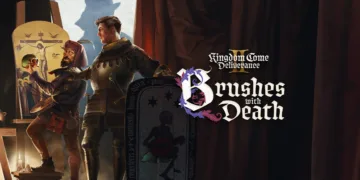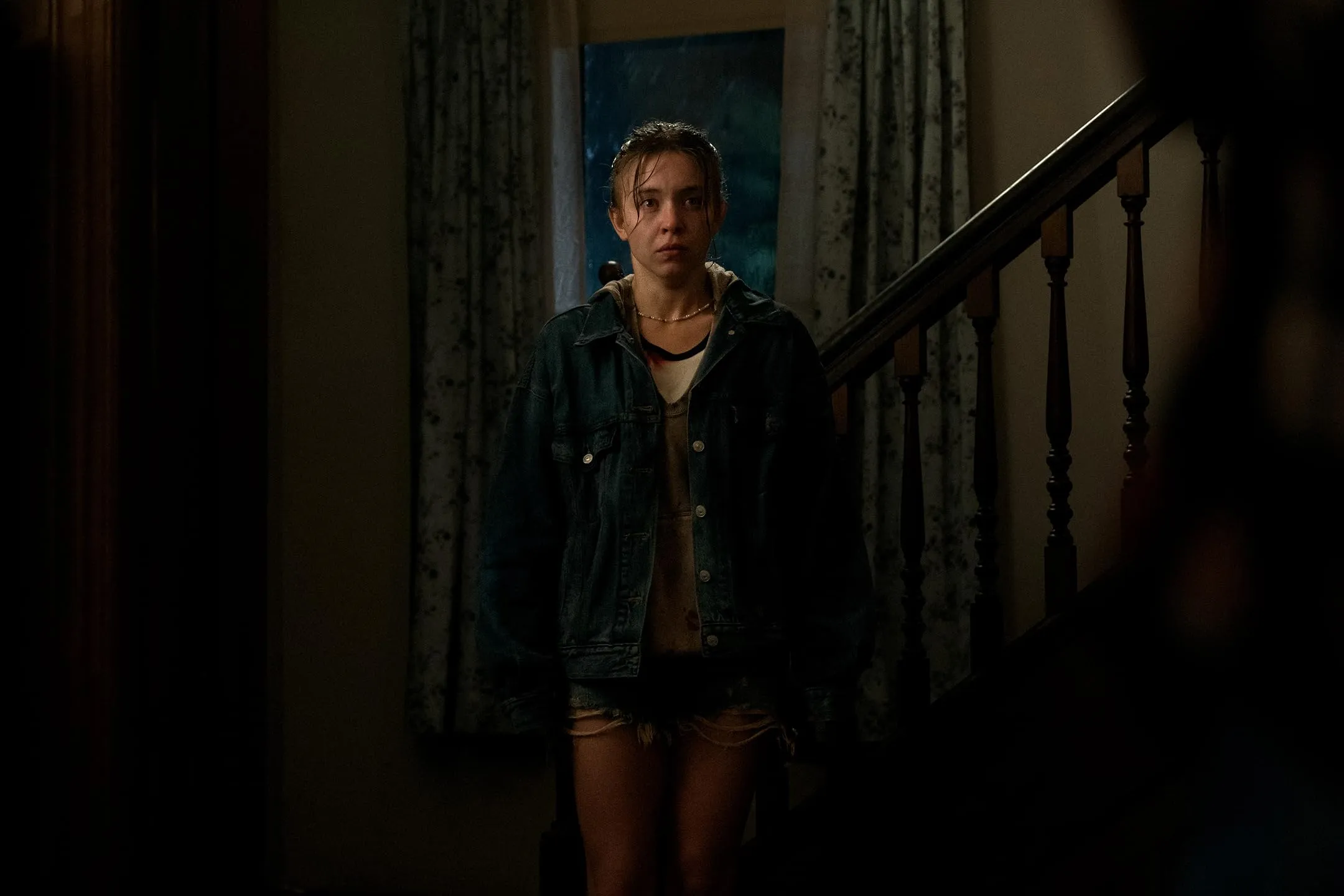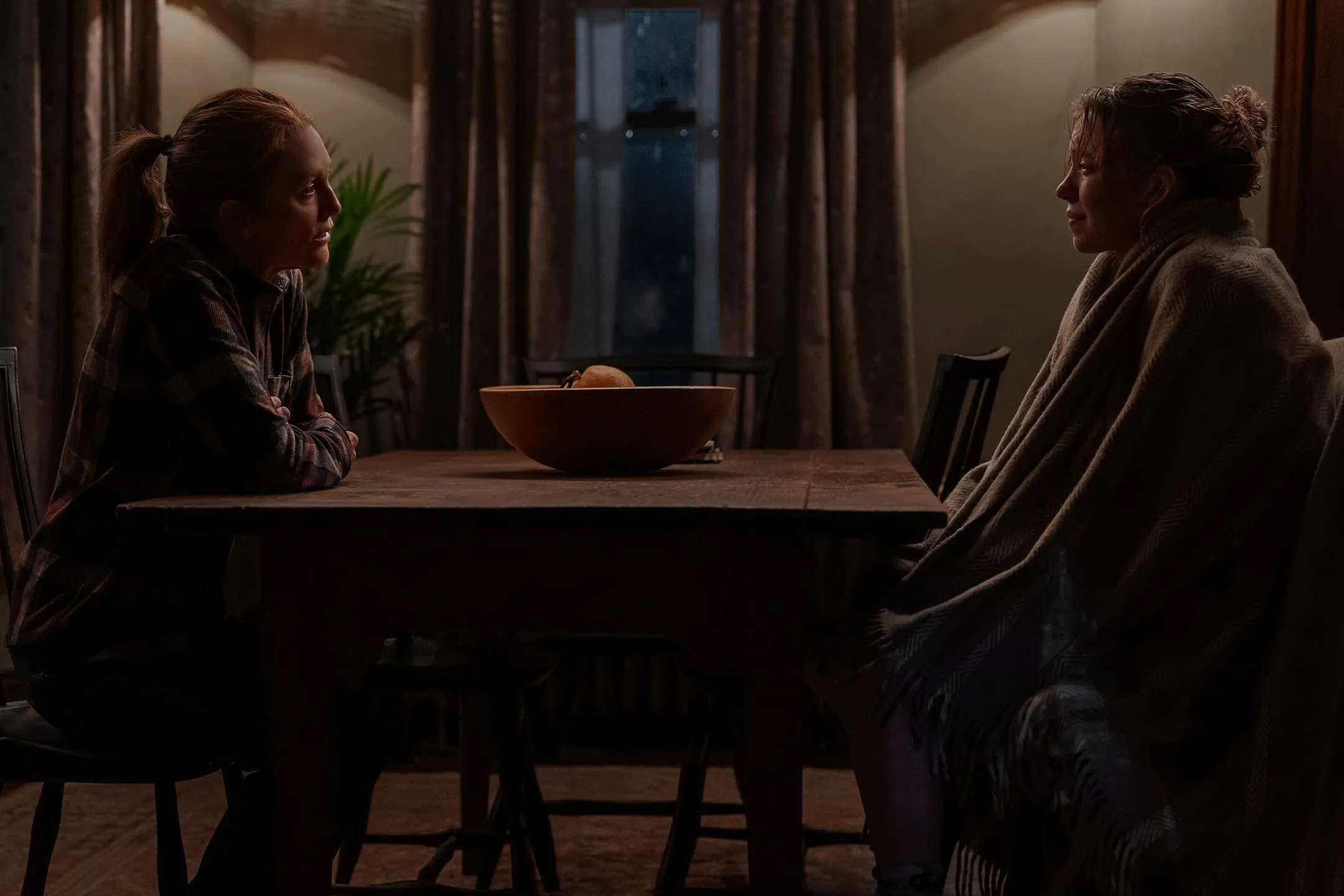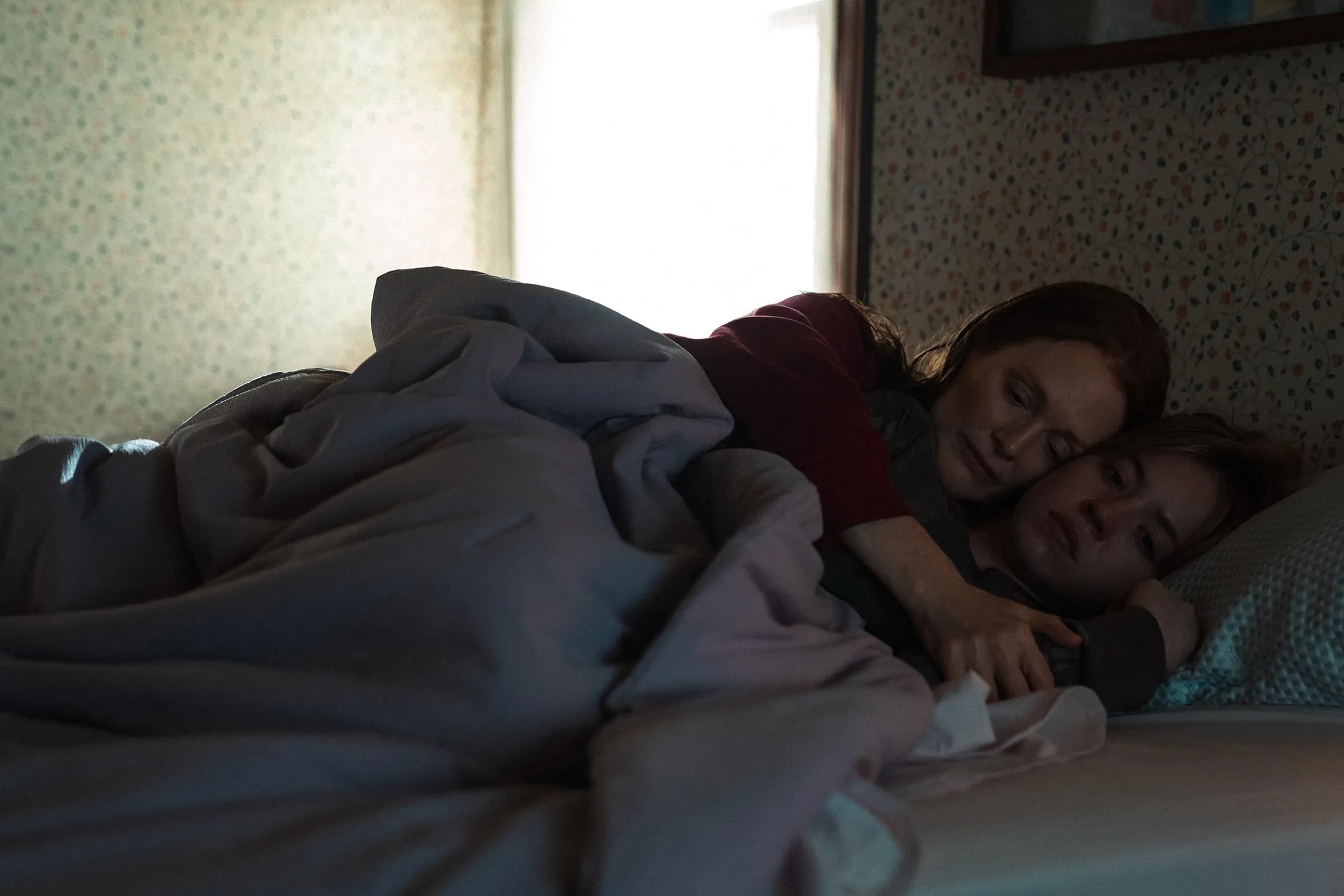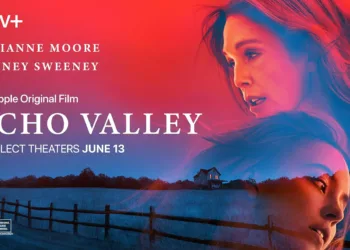In the quiet corners of rural Pennsylvania, Kate Garretson’s life operates on a loop of loss. Portrayed by Julianne Moore, Kate moves through her days on a sprawling horse ranch that feels less like a home and more like a monument to her late wife, Patty. Each morning is a ritual of grief, a holding pattern defined by financial pressures and a palpable sadness that hangs in the air. This initial state of stillness establishes a baseline of sorrow, setting a stage where any disruption feels seismic.
The disruption arrives in the form of her daughter, Claire. Sydney Sweeney brings a jittery, desperate energy to the role, a young woman whose history with addiction has already worn deep grooves into her relationship with her mother. But this is no ordinary visit. Claire’s late-night arrival, frantic and spattered with blood, brings with it a horrifying problem: a dead body in her car.
In an instant, the film’s narrative engine ignites. The weight of Kate’s grief is violently displaced by the immediate, terrifying weight of a choice that will redefine her life. This is the point where the story asks its true question: what does a mother do when her child becomes her greatest danger?
The Ultimate Escort Mission
The bond between Kate and Claire functions much like a corrupted questline in a narrative-driven game. The initial setup shows us their established loop: Claire, spiraling from her addiction, appears with a need, and Kate, motivated by a powerful but damaging love, provides the solution.
Early arguments about money serve as the tutorial for this broken system, familiarizing us with the manipulative patterns Claire employs and Kate’s instinct to enable her. This isn’t a relationship of equals; it is a long-suffering parent trying to manage an unpredictable, high-risk asset.
When the dead body appears, the film smartly sidesteps the illusion of choice often found in interactive stories. Kate’s reaction isn’t a calculated moral decision; it’s a system override. There is no dialogue wheel, no moment of quiet contemplation.
Her protective instinct is a reflex that immediately boots up a new, terrifying objective: hide the evidence, protect the child, whatever the cost. In that instant, her moral compass is not just ignored, it is shattered by a love so absolute it bypasses logic entirely. The film locks her onto this path, making her a participant in a mission she never truly accepted.
This positions parental devotion as the story’s central, high-stakes mechanic—a source of incredible strength that is simultaneously a critical weakness. Her love is the very thing the antagonist, Jackie, can exploit. In stark contrast are the moments of respite Kate shares with her friend, Leslie. These scenes feel like safe zones, offering a different model of connection built on mutual support, not desperate preservation.
They provide a necessary glimpse of a healthier dynamic, reminding us just how toxic and draining Kate’s main quest has become. It leaves you wondering what happens when the one person you are hardwired to protect is also the primary source of danger.
A Masterclass in Character Builds
A story like this lives or dies by its performances, and Echo Valley essentially presents a trio of perfectly calibrated character builds. Julianne Moore’s Kate begins as a character seemingly specced entirely into grief, her movements heavy and her energy depleted. But the moment the crisis hits, we witness a stunning real-time respec.
The quiet sadness gives way to a panicked, steely resolve. Moore masterfully shows this dormant personality—a formidable, resourceful woman—being unlocked not by choice but by a desperate need to protect her daughter. It’s like watching a player character suddenly discover a powerful new skill tree they never knew they had, born from the game’s most intense moment.
Opposite her, Sydney Sweeney’s Claire is a volatile chaos agent. Her performance is intensely physical, a collection of nervous tics, jittery movements, and a pleading gaze that can snap into a furious outburst without warning. She embodies the unpredictable nature of an addict, making every interaction feel like a dangerous quick-time event. You’re never sure if she will help or hinder the situation, and Sweeney makes that instability feel both tragic and terrifying.
Then there is Domhnall Gleeson as Jackie, the film’s antagonist. Gleeson brilliantly subverts his friendly, approachable screen presence to create a truly unnerving villain. He’s not a monster who shouts; he’s a slippery, intelligent predator whose threats land with more weight because of his calm delivery.
His quiet menace is a fantastic piece of character design, a psychological boss battle in a film that could have settled for a simple physical threat. Brief appearances from Fiona Shaw, who offers a warm safe-zone for Kate, and a fiery Kyle MacLachlan in an impactful cameo, round out a world populated by sharply defined personalities. The film puts these three core actors on a collision course, leaving you to watch the riveting, terrifying chemistry between them.
The Aesthetics of a Trap
The world of Echo Valley is built with the precision of a carefully designed game level, intended to look beautiful while slowly constricting around its player. Director Michael Pearce acts as the lead designer, expertly managing the experience’s tone. He guides the film from a somber, slow-burn grief drama into a high-stakes domestic thriller, ensuring the tension comes from intimate character betrayals, not cheap scares. The horror here is emotional, rooted in the violation of a family sanctuary.
This transformation is achieved through the superb work of cinematographer Benjamin Kracun. The sprawling horse ranch, initially a symbol of Kate’s isolation and loss, is systematically turned into a gilded cage. A muted color palette drains the life from the lush Pennsylvania landscape, creating a persistent feeling of melancholy.
Kracun’s camera often pulls back to show the vast, empty space surrounding the characters, only to then push in, trapping them in tight frames that amplify their claustrophobia. Specific techniques, like a jarring use of slow-motion during a key confrontation or a high-angle shot that renders the characters small and helpless, serve as powerful tools to heighten the emotional stakes of a moment.
Layered on top is Jed Kurzel’s score, which acts as the perfect ambient audio. Its melancholic themes reinforce Kate’s inner state, while the low, foreboding strings function as an effective threat-detection system for the audience. The music swells not with action, but with dread. All these elements work in concert to build an impeccable atmosphere of dread, a beautiful trap designed to be inescapable.
Strong Early Game, Weak Final Boss
For its first half, Echo Valley runs on a beautifully written script that understands the power of a limited perspective. Brad Ingelsby’s screenplay functions like a top-tier narrative game, locking the camera firmly behind Kate’s shoulder. We only know what she knows, feel what she feels.
This commitment makes her catastrophic decision to help Claire feel emotionally logical, even inevitable. The setup is fantastic; its character work is deep, its world is believable, and its central conflict is established with skill. The story’s code is clean, and its core mechanics are sound.
But as the game progresses, bugs start to appear in the system. The pacing, once a controlled burn, becomes erratic. Long stretches of inactivity are punctuated by sudden, jarring pivots in the plot that feel less like organic developments and more like the script taking narrative shortcuts.
Certain character choices strain credibility, forcing a suspension of disbelief that the story hasn’t quite earned back. It feels like the developers started using cheap tricks to move the plot forward, rather than relying on the strong character logic they first established.
The most significant issue arrives in the third act, which feels like the developers abandoned their unique, emotionally complex RPG for a generic final boss fight. The story fatally shifts its focus from the messy, fascinating mother-daughter relationship to a far more conventional cat-and-mouse thriller between Kate and Jackie. This pivot drains the film of its most potent source of tension.
The resolution that follows is abrupt and hinges on a plan that feels strangely conceived, offering a simple solution to an incredibly complex problem. It provides an ending, but not the emotionally resonant one the story’s powerful beginning seemed to promise.
Echo Valley had a limited theatrical release in the United States and Canada on June 6, 2025, and is scheduled for global streaming on Apple TV+ starting June 13, 2025.
Full Credits
Director: Michael Pearce
Writer: Brad Ingelsby
Producers: Brad Ingelsby, Ridley Scott, Michael A. Pruss, Kevin J. Walsh
Executive Producers: Rebecca Feuer, Nicole Jordan-Webber, Erika Olde, Sam Roseme, Ted Deiker, Scott Greenberg
Cast: Julianne Moore, Sydney Sweeney, Domhnall Gleeson, Kyle MacLachlan, Fiona Shaw, Edmund Donovan, Albert Jones, Rebecca Creskoff, Audrey Grace Marshall, Stella Chivee
Director of Photography (Cinematographer): Benjamin Kračun
Editor: Maya Maffioli
Composer: Jed Kurzel
The Review
Echo Valley
Echo Valley starts as a masterfully crafted, atmospheric thriller powered by a trio of phenomenal performances. Julianne Moore is exceptional as a mother pushed to the edge, and the film's initial exploration of toxic parental love is gripping. However, this strong foundation crumbles under the weight of an unbelievable third act that abandons its most interesting ideas for a conventional and disappointingly abrupt finale. It is a film of immense promise that sadly fails to stick the landing, leaving a powerful setup to wither into a generic conclusion.
PROS
- An outstanding and layered lead performance from Julianne Moore.
- Intense and effective supporting turns from Sydney Sweeney and Domhnall Gleeson.
- A beautifully crafted, melancholic, and tense atmosphere.
- A powerful and emotionally resonant initial premise.
CONS
- The plot becomes contrived and unbelievable in the final act.
- Uneven pacing disrupts the narrative flow.
- The story abandons its core mother-daughter theme for a less interesting showdown.
- An abrupt and emotionally unsatisfying resolution.



































